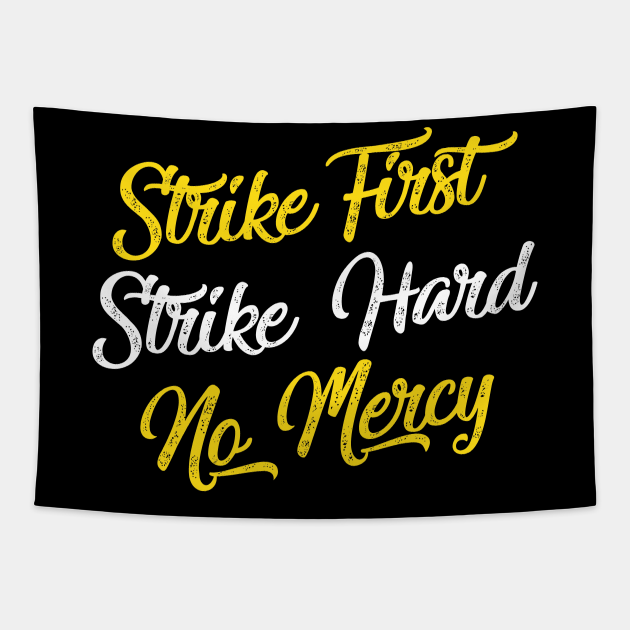


He’s right that administrators do not prepare young people for adulthood and instead aim to “take away from them entirely the trouble thinking and the pain of living.” On the other hand, the reach of the administrators is incomplete.

#Strike first strike hard no mercy series#
The Cobra Kai series shows that Tocqueville is partially right. Individuals will withdraw into their isolated private circle of friends and family and abandon care for the community to administrators. Tocqueville warns of the soft despotism that can “degrade men without tormenting them” as it “takes charge of assuring their enjoyments and watching over their fate.” Tocqueville fears that Americans will give up their liberty and give in to being ruled by schoolmasters so long as they may live in ease and comfort. After a school fight, overweening administrators promise parents that it won’t happen again, because they have implemented a “new initiative called ‘Hugs Not Hits.’” Without irony, the school counselor boasts that “it’s like DARE except it actually works.” The administration’s goal is “to make this school a safe space for all students.” The administration asks little of the students, but that they readily submit to its processes and scripts. Showing mercy is not weakness, but as Portia in The Merchant of Venice says, it is “mightiest in the mightiest.” We grant mercy to those who wrong us out of our goodness, not theirs, and out of hope to receive it in return.īy contrast, the high school administrators purport to promote the dignity of all persons and to advance policies to make students feel valued. That’s the exhilarating and liberating side of being a badass, but as Johnny learns, the education of a badass must be oriented toward choosing to do right and showing mercy. Badasses act confidently and with certainty, especially when times are uncertain, because they know that what happens is up to them.
#Strike first strike hard no mercy how to#
Through karate, Johnny teaches the students how to defend themselves, to be sure, but being a badass is more than shielding oneself from attack. Eli, now going by the nickname “Hawk,” gets a blue mohawk, a brilliantly colored hawk tattoo across his back, and heaps of brash self-confidence to boot.īeing a “badass” is what Johnny holds up as an ideal for the students. Johnny teaches him how to “flip the script” and embrace being looked at by others on his own terms. Eli Moskowitz, a painfully shy, nerdy young man who has been bullied for having a cleft lip scar is immobilized with fear and self-doubt. That’s exactly what these thin, reedy-spirited students need. Johnny reestablishes the Cobra Kai dojo and welcomes a group of nerdy misfits who thrive on his “tough love” and healthy doses of 1980s heavy metal-Mötley Crüe, Twisted Sister, Poison, AC/DC. Johnny Lawrence, once the Cobra Kai rival to Daniel LaRusso, is now a loser and bad father, but learns how to make amends by teaching bullied students karate and how to stand up for themselves. The series thereby offers a much-needed reminder that democracies require moral education, because human dignity is grounded in our capacity for moral decisions.Ĭobra Kai picks up 30 years after the events in The Karate Kid (1984). In so doing, the series corrects Cobra Kai’s original mantra of “strike first, strike hard, no mercy” to temper spirited self-confidence with mercy and forgiveness. C obra Kai, Netflix’s Karate Kid spinoff series whose third season wrapped up earlier this year, offers an alternative to two grave dangers to moral education today: the enervating rule by administrators, or to use Tocqueville’s parlance, rule by schoolmasters, and the violent reaction against soft despotism, rule by the strong.


 0 kommentar(er)
0 kommentar(er)
